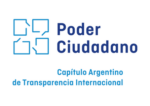Argentina: Recovering with Integrity - Fostering Preventive Transparency in the Health System

Lessons Learned by Ana Pichon Riviere
Public Sector Coordinator and Institutional Strengthening, Poder Ciudadano.
Results included:
-
-
- Providing vital Covid-19 healthcare information to citizens;
- Exposing abuses by high government officials;
- Litigating to enhance government accountability; and
- Building partnerships with other CSOs in Argentina and in the region.
-
As Ana describes, the core model used in the programs was based on four strategic pillars:
-
- ethical exercise of the public function;
- transparency and maximum disclosure of the acts of the government;
- participation and social control of public management; and
- accountability
The intervention model aims to strengthen the entire value chain—prevention, detection, investigation, sanction, recovery of property and reparation of victims. Poder Ciudadano as a civil society organization used a five-tier strategy against opacity and demand greater accountability:
-
- Monitoring Institutions
- Generating Information and Evidence
- Building Networks
- Engage Constructively and
- Strategic Litigation
With the onset of COVID-19, and with PTF support, “information gathering” was the first critical goal of the program. Poder Ciudadano quickly recognized that government agencies were failing totally and efforts were launched, eventually leading to the creation of a special website -“The Observatory” – to ensure citizens received vital information. The success of the program also demanded “monitoring” – with investigationjs uncovering that privileged people were receiving special healthcare and, in fact, a celebration was held during the full lock-down period at the President’s official residence. These initiatives led to the resignation of a Minister of Health, and to judicial investigations.
As Ana explains in the accompanying video, Poder Ciudadano, inhitiated litigation when governmenta agencies failed to provide information to citizens, it worked with other CSOs to ensure maximum information dissemination to the public, and where possible, it sought to work constructively with the government.
Project Team
Pablo Secchi
Executive Director, Poder Ciudadano
Karina Kalpschtrej
Deputy Executive Director, Poder Ciudadano
Ana Pichon Riviere
Public Sector Coordinator and Institutional Strengthening, Poder Ciudadano
Daniel Ritchie
Executive Committee, PTF
Stephani Gutierrez
Program/Operations Officer, PTF
Roberto Laver
Project Adviser, PTF
Ramana Gandham
Project Adviser, PTF
About Our Partner
Poder Ciudadano is a non-partisan and non-profit foundation born in 1989 as an initiative of a group of people concerned about the defense of civic rights in Argentina.

Social Media
On Twitter: @PTFund / @poderciudadano
On Facebook: Partnership for Transparency /
Fundación Poder Cuidadano
On LinkedIn: Partnership for Transparency /
Fundación Poder Cuidadano

